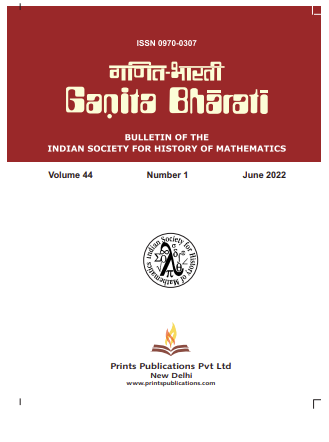Ganita Bharati
Published in Association with Bulletin of The Indian Society for History of Mathematics
Current Volume: 45 (2023 )
ISSN: 0970-0307
Periodicity: Half-Yearly
Month(s) of Publication: June & December
Subject: Mathematics
DOI: https://doi.org/10.32381/GB
Online Access is Free for Life Member
The Central Role of Incommensurability in Pre-Euclidean Greek Mathematics and Philosophy
By : Stelios Negrepontis, Vassiliki Farmaki, Marina Brokou
Page No: 1-34
Abstract
In this paper we outline the tremendous impact that the Pythagorean discovery of incommensurability had on pre-Euclidean Greek Mathematics and Philosophy. This will be a consequence of our findings that the Pythagorean method of proof of incommensurability is anthyphairetic, namely depends on Proposition X.2 of the Elements, according to which if the anthyphairesis of two line segments is infinite, then they are incommensurable.
Our fundamental finding is that the main entity of Plato’s philosophy, the intelligible Being, is a philosophical analogue/imitation of a dyad in periodic anthyphairesis.
One byproduct of our deeper and mathematical understanding of Plato’s philosophy is that we can next show (a) that Plato’s intelligible Beings coincide with the earlier Zeno’s true Beings, and (b) that the purpose of Zeno’s arguments and most exciting paradoxes is not to deny motion or multiplicity, as usually thought, but to separate the true Beings from the sensible entities of opinion.
Although Plato’s early/middle work is greatly influenced by the Pythagoreans and Zeno, in his late work he employed via philosophical imitation, the stunning discovery of the great Athenian mathematician Theaetetus, namely the palindromic periodicity theorem for quadratic incommensurabilities (established in modern era by Lagrange and Euler).
The study of incommensurability via periodic anthyphairesis produced great Mathematics and great Philosophy; however this approach could only deal with quadratic, and did not extend to solid incommensurabilities. Archytas and Eudoxus marked the beginning of a new, non-anthyphairetic era for incommensurability.
In one way or another, the Greek Mathematics (Pythagoreans, Theodorus, Theaetetus, Archytas, Eudoxus) and Philosophy (Pythagoreans, Zeno, Plato) of the pre-Euclidean era were dominated by the Pythagorean discovery of incommensurability.
Authors :
Stelios Negrepontis
Professor Emeritus, Mathematics Department, Athens University, Athens, Greece.
Vassiliki Farmaki
Professor Emeritus, Mathematics Department, Athens University, Athens, Greece.
Marina Brokou
Ph. D. Candidate, Mathematics Department, Athens University, Athens, Greece.
DOI: https://doi.org/10.32381/GB.2020.42.1-2.1




